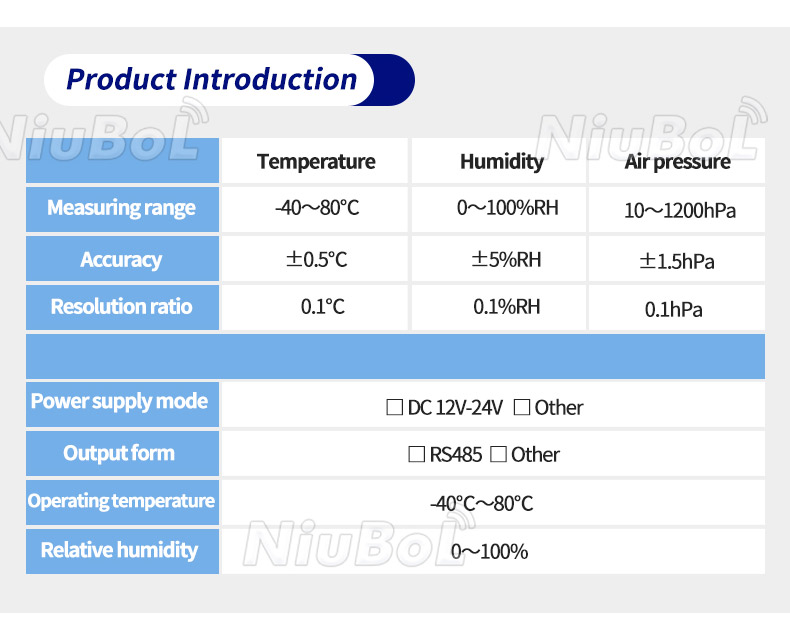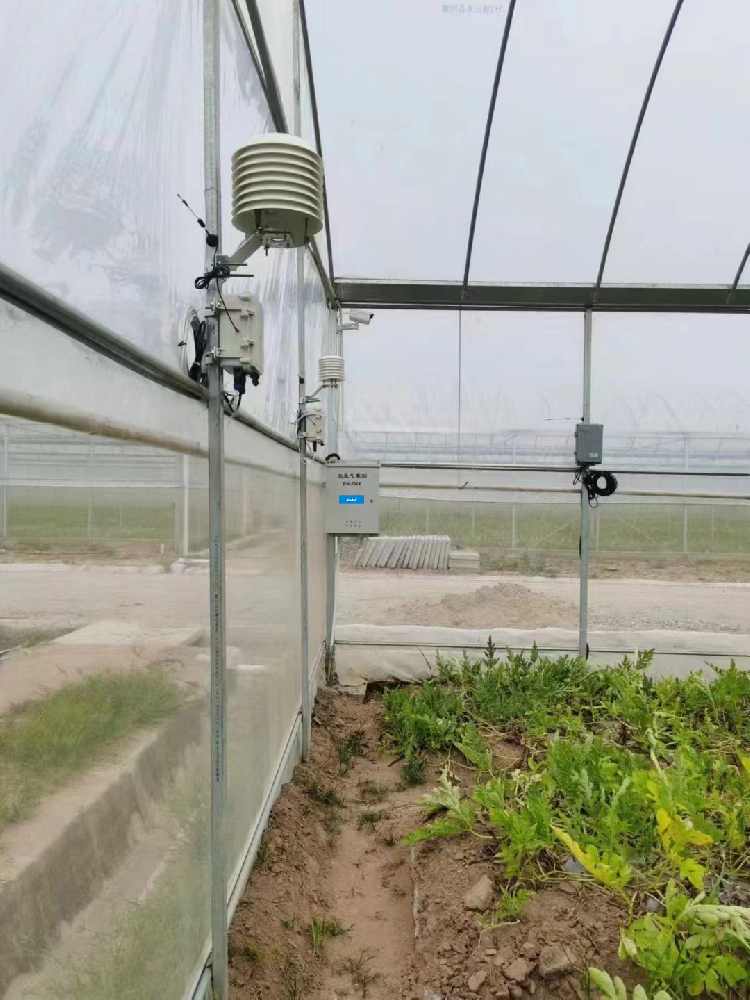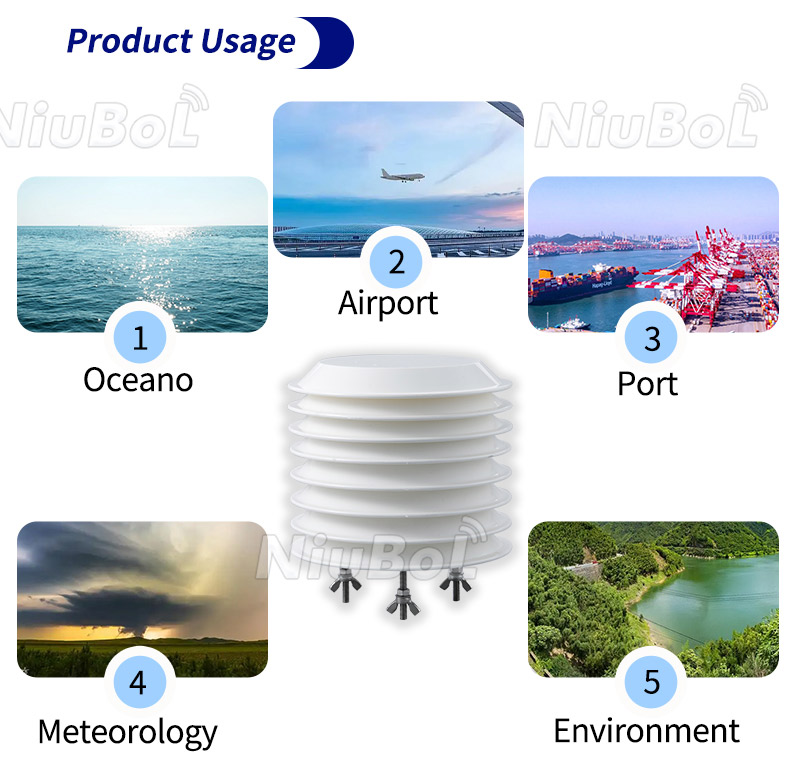

— Blogs —
—Products—
 Consumer hotline +8618073152920
Consumer hotline +8618073152920 WhatsApp:+8615367865107
Address:Room 102, District D, Houhu Industrial Park, Yuelu District, Changsha City, Hunan Province, China
Product knowledge
Time:2024-09-17 09:46:51 Popularity:2685
A temperature and humidity sensor is a device that can simultaneously measure the temperature and humidity of an environment. It usually consists of a temperature sensor and a humidity sensor, either as two separate sensors or as a composite sensor integrated into a single unit. Temperature and humidity sensors are capable of converting physical quantities (temperature and humidity) into electrical signals that can be read and displayed by data loggers, microcontrollers, or other display devices.
Temperature and humidity sensors are used in a wide variety of applications including, but not limited to, agriculture, industry, meteorology, environmental protection, building management, food storage, healthcare, home automation, and more.
- Temperature Sensors: Temperature can be measured in a variety of ways, such as thermocouples, thermistors (NTC or PTC), resistance temperature detectors (RTDs), and so on. These sensors measure temperature by changes in resistance or voltage caused by changes in temperature.
- Humidity Sensors: Capacitive, Resistive and Dewpoint are common. Capacitive humidity sensors detect humidity by measuring changes in the dielectric constant of the medium (usually air), while resistive humidity sensors work by measuring the effect of humidity on the resistance of the sensor material.

Temperature and humidity sensors have a wide range of applications in many fields, the following are some of the main application scenarios:
1. Agricultural field: In greenhouses, greenhouses and other facilities, temperature and humidity sensors are used to monitor the environmental conditions of crop growth, adjust the temperature and humidity in a timely manner, and improve crop yield and quality.
- Monitor the environment in the greenhouse to optimize plant growth conditions.
- Control the irrigation system to automatically adjust irrigation according to soil moisture.
2. Industrial field: in the electronics manufacturing, printing, pharmaceutical and other industries, temperature and humidity have an important impact on product quality and production process. Temperature and humidity sensor to ensure the stability of the production environment, improve product quality and production efficiency.
- Control the environment of the production workshop to ensure product quality and normal operation of equipment.
- Monitor the temperature in cold chain logistics to ensure product quality.

3. Meteorological monitoring: in weather stations, weather radar and other equipment, temperature and humidity sensors real-time monitoring of temperature and humidity, to provide accurate data support for weather forecasting.
4. Environmental monitoring: in forests, grasslands and other nature reserves, temperature and humidity sensors help environmental protection departments to understand the impact of temperature and humidity on the ecology, timely detection of environmental problems and take appropriate measures.
5. Building management: Temperature and humidity sensors are used for temperature and humidity monitoring in buildings to optimize the control of air conditioning and humidification equipment and improve energy efficiency.
6. Food storage and transportation: Temperature and humidity sensors monitor the temperature and humidity of food to ensure the safety and quality of food during storage and transportation.
- Monitor temperature and humidity in the warehouse to prevent moisture or damage to goods.
- Ensure the freshness and safety of food during storage and transportation.
7. Healthcare:
- In hospitals and laboratories, temperature and humidity sensors monitor the storage conditions of pharmaceuticals and biological samples to ensure their quality and safety.
- Monitor environmental conditions in hospital operating rooms, laboratories and wards.
- Control the temperature and humidity of drug storage environments to ensure drug effectiveness.
8. Home automation: In smart home systems, temperature and humidity sensors monitor the indoor environment and automatically control air conditioning and humidification equipment to provide a comfortable living environment.
9. Server room: In the server room, temperature and humidity sensors monitor environmental conditions to ensure the normal operation of servers or processors and prevent overheating or static hazards.
10. Intelligent Agriculture: In intelligent agriculture systems, temperature and humidity sensors monitor the temperature and humidity of farmland and soil to help control irrigation and fertilization for precision agriculture.

Summarize
Temperature and humidity sensors play an important role in various fields of modern society, from optimizing agricultural production to guaranteeing the quality of industrial products, from improving the living environment to promoting scientific research, they are indispensable tools. By monitoring and accurately controlling environmental conditions in real time, temperature and humidity sensors help various systems and devices operate better. With the development of Internet of Things (IoT) technology, the application scope of temperature and humidity sensors will be further expanded, bringing more convenience to people's life and work.
Related recommendations
Sensors & Weather Stations Catalog
Agriculture Sensors and Weather Stations Catalog-NiuBoL.pdf
Weather Stations Catalog-NiuBoL.pdf
Related products
 Combined air temperature and relative humidity sensor
Combined air temperature and relative humidity sensor Soil Moisture Temperature sensor for irrigation
Soil Moisture Temperature sensor for irrigation Soil pH sensor RS485 soil Testing instrument soil ph meter for agriculture
Soil pH sensor RS485 soil Testing instrument soil ph meter for agriculture Wind Speed sensor Output Modbus/RS485/Analog/0-5V/4-20mA
Wind Speed sensor Output Modbus/RS485/Analog/0-5V/4-20mA Tipping bucket rain gauge for weather monitoring auto rainfall sensor RS485/Outdoor/stainless steel
Tipping bucket rain gauge for weather monitoring auto rainfall sensor RS485/Outdoor/stainless steel Pyranometer Solar Radiation Sensor 4-20mA/RS485
Pyranometer Solar Radiation Sensor 4-20mA/RS485
Screenshot, WhatsApp to identify the QR code
WhatsApp number:+8615367865107
(Click on WhatsApp to copy and add friends)
